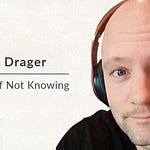Today’s episode is an interview Charlie gave to the founder of Record the Journey, a non-profit that provides outdoor adventures and photography training to military veterans and their families to make the process of transition easier. Charlie wanted to share this interview to bring light to challenges transitioning veterans face and to amplify Rachael’s great work.
Key Takeaways:
[1:50] - Charlie talks about his history with military service, and how he juggled active duty and working towards his PhD at the same time.
[5:48] - He came back healthy - both mentally and physically, which made the transition back to civilian life a little easier.
[8:02] - Charlie’s experience transitioning back to grad school actually shed light on his own mission. The operating system he was using in the military wasn’t going to help him build his career and life here. It is a different skill set than responding to missions from his commanders and leaders.
[11:30] - Charlie talks about some of the differences between military and civilian life, specifically community and routine. The focus was more single-minded when Charlie was deployed, and coming home, there are a lot of different things to worry about and make time for.
[15:57] - One of the difficult things about making the transition is that how you orient fundamentally to other people changes. One of the main goals of Record the Journey is to share the stories of successful transition with other military members.
[17:10] - One of the adjustments Rachael is making is getting comfortable with the label of being a creative or being an artist. For her, the tension was between being creative and being in active duty, and for Charlie, the tension was actually between being academic and being in active duty.
[21:20] - One of the strengths the military brings into the civilian community is the “can-doisms.” As veterans transition back to the workforce, the focus is more on whether they can or can’t get the job done. This, along with Charlie’s work, helped Rachael take control of her own map and start doing things for herself.
[27:05] - Where many transitioning military members, or civilians, thrive, is when we are intentional about building a squad around us that enables us to do what we do best. This squad or success pack can help get everyone where they need to go, and is often a connection that is missing for veterans transitioning back.
[29:30] - One thing people with no military experience need to understand is that coming back is an identity shift, not just a new job. When you’re in the military, there is an entire culture of who you are that changes when you come out. It is important for civilian society to pay attention to what they can learn from transitioning veterans to improve their communities and organizations.
[31:15] - For any listener, think about the map you’re following, and whether it’s a map or route that you created. When you get off a given route or map, you start finding your way to do your best work. Getting clear about your core values, and giving yourself permission to cultivate those values, can help guide your route.
[37:50] - Especially during this time of COVID, it’s important to make the most of your time. Framing your priorities in a timeline will get things real clear, real fast. If your map is not taking you toward a priority project, figure out why not.
[42:05] - The journey is different for different veterans. For some, it’s a journey making their map, for others, it’s reintegrating, and for some, it’s reconciling who you were before and who you are after your service.
[45:55] - It is easy to get stuck in the heartbreak and mishaps, but when you get away from those moments, you realize that they are an important part of the story. Moving with these moments changes your experience in the moment, in a way that you may not see until later.
[51:15] - Think about your map being written on a white board; if something happens you can change your map. You don’t have to create your map in permanent marker! When you get new information, you can make an adjustment that’s right for you.
[53:20] - The transition back to civilian life is also a challenge for families of service members. Their family becomes their own squad while military members are gone, and it’s an adjustment coming home and figuring out how things have changed and how everyone fits together.
[59:25] - The emotional weight of things doesn’t often line up with the physical transition. The reintegration process is not necessarily linear, and both parties need to give it space to breathe when it comes up, and work through it together.
[1:06:32] - There is nothing wrong with the way the body and the brain deals with these responses. Take time to engage with it - that is how you will move through it. Walls are broken down with words first.
Mentioned in This Episode:












